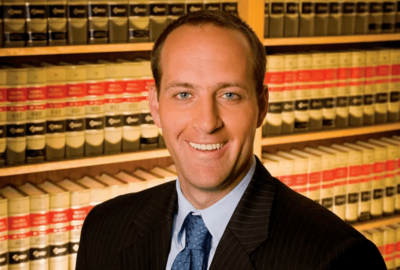Hubbard Radio Washington DC, LLC. All rights reserved. This website is not intended for users located within the European Economic Area.
A new podcast gives a very unique perspective to the Fat Leonard case
The now-infamous "Fat Leonard" case stretched far and wide into the Navy contracting community and its officer ranks, and it may not be over yet.
Best listening experience is on Chrome, Firefox or Safari. Subscribe to Federal Drive’s daily audio interviews on Apple Podcasts or PodcastOne.
The now-infamous “Fat Leonard” case stretched far and wide into the Navy contracting community and its officer ranks, and it may not be over yet. A new podcast provides new insight to the man at the center of it all by speaking to “Fat Leonard” directly:
“Everybody has their needs. And, you know, I gave them that sense of confidence. And I also provided them what they wanted. And it was safe, and they could trust me, and I never let them down. I played professional, I played sexual – whatever you needed,” says Leonard Francis, the man currently facing several charges from the U.S. government, in the new podcast “Project Brazen.”
Tom Wright, a reporter for The Wall Street Journal and co-founder of the series, recently spoke to Federal News Network’s Eric White for Federal Drive with Tom Temin, to discuss what he heard from Francis.
Interview transcript:
Tom Wright: Starting in 2015 I covered a story about the 1MDB scandal in Malaysia, which resulted in a 2018 book called “Billion Dollar Whale,” and the fraudster at the center of that scandal is called Jho Low, and he comes from an island in Malaysia called Penang. And Leonard Glenn Francis, who obviously is at the center of this new podcast, Fat Leonard, also comes from Penang. It’s not a very big island. And there was a character that I got to know writing “Billion Dollar Whale,” who’d been sort of around some of the characters in that book, who also knew Leonard Francis. And we got talking and it turned out that Leonard Francis wanted to talk. And he had been in house arrest – jail and house arrest for eight years in San Diego, and was furious about the fact that he had not yet been sentenced. And he was obviously the star witness in the government’s case, in this huge Navy contracting scandal of which Leonard had pleaded guilty. But he was angry that he for a number of reasons: One is he hadn’t been sentenced. The other was that he saw that he believed the Navy was covering up the involvement of very senior admirals. And then also he was he was dying of cancer, he had late-stage cancer. And so all these things coming together, pushed him to rip up his plea deal, and decide to talk to me.
Eric White: Yeah, and so – I’m curious what those first conversations were like. This is a person who, there’s been tons of coverage and as you said, he hasn’t really been out there talking openly as he has in talking with you. What were some of those discussions like that were on and off the record?
Tom Wright: Well, it was all on the record. So that’s what’s so astounding about this, as – in my 20-plus years in journalism, I never really had a situation where somebody who’s yet to be sentenced as a cooperating witness in a major government trial has decided to talk. So we sent him a microphone and a boom arm and he put that in, he sort of set it up in his house. At the beginning, he was a little guarded, but to be honest, he is somebody who craves attention. And, he’d spent most of his life, most of his adult life sort of at the center of this big company, Glenn Defense Marine Asia, that he’d built up, with Navy officers at his beck and call because obviously he would ply them with prostitutes and fine wine and dinners and Cohiba cigars and Dom Perignon, and all of this. And he was constantly in this world where he was living in a $130 million mansion in Singapore with 20 luxury cars, and he’s living this sort of “Wolf of Wall Street” life. And then suddenly he’s arrested in a sting in 2013 for his involvement in all this corruption. And then he’s he’s lonely and craving that attention. And I think that’s what I gave him. I mean, in the podcast, in Episode One, he refers to me as his shrink because he wanted to – he wanted someone to talk to.
Eric White: Yeah, that attention-seeking behavior and listening to him. He sounds very jovial. Do you think that’s how he was able to kind of penetrate the Navy contracting system so well, was that he was, he’s sort of likable?
Tom Wright: Yeah, I think that’s right. He is likable. I mean, when you listen to the podcast, you’re going to see that he’s likable, but it’s very superficial. And my relationship with him is like a rollercoaster. You’re gonna like him, you’re gonna see that he’s competent, I mean one of the reasons that he was so successful is that he’s extremely competent. When [Naval Base] Subic Bay shut down in the early 1990s, Leonard came along and he opened up Bali. And he was a back man for the Navy. He went in and he paid bribes in Bali and Indonesia to get a pier built there and to create infrastructure for the Navy for R&R. And so he did that. Then when the First Gulf War happened, he was in Penang and he was – became a bigger sort of husbanding agent for the ships that were coming through to the war. And then after Sept. 11 and the attacks on the USS Cole, the year before in 2000, he started to make a lot more money because he was again very competent at meeting the U.S. Navy’s requirements for protection of the fleet. So he created something that was called the “ring of steel,” which were steel barges strung together around the outsides of ships. And he would even anchor them down and did a much better job than and no one else was offering this kind of service. And he ended up charging hundreds of thousands of dollars – up to millions of dollars for these ship visits. So he started to become become wealthy. So there’s charm, there’s the parties, there’s the all the extracurricular stuff, but then there’s also the fact that he met a need that the Navy- the Navy’s requirement for safety and for other requirements that they had.
Eric White: Yeah, it sounds like there was a lot of right-place-right-time-kind of stuff going on. You discussed a little bit about how your relationship with him over the course of your conversations went sort of up and down. You know, without making you give away too much, what were some of the more contentious topics that he was kind of begrudged to be speaking about with you?
Tom Wright: One of the startling facts of this podcast series is the misogyny that runs through – and I hate to say this, but it runs through the Navy. Leonard has a huge problem with women. And there’s some shocking facts, we’re going to reveal in this about the treatment, the cruel treatment of women. We go back to Tailhook [Convention] in the early 1990s. Obviously, you know what that is but a lot of people don’t know what it is. And we look at the sexual assault there. And then we then we come forward. Leonard grew up in a violent household, his father was abusive, his father would come home with other women – this is according to Leonard on tape – he would beat his mother, lock his mother in the closet. And then, have his way with those women with the children in the house, he’d beat his children. So Leonard grew up in an abusive household. He then went on to have a very warped view of women himself. He talks at length about women as hookers when they’re not even escorts or prostitutes. So just, in fact, he calls the – in one of our tapes, he refers to women that he’s had relationships with as that.
Eric White: Yeah, getting away from the man at the center of all this. I imagine you had a chance to speak to many current and former Navy officials. What was the sense that you got from them? Is this still something of an embarrassment that a lot of people are trying to cover up? Or are they out in front of it finally?
Tom Wright: No, I don’t think they’re right in front of it. I think it’s – there’s been an attempt to protect their own. A lot of people I spoke to in the Navy said that, they use this phrase, “different spanks for different ranks.” Clearly, we talked to one guy – called David Capone. He was in one of the episodes, he just got out of jail. He did an 18 month sentence. And he’s furious, because he’s reading the censure letters that the admirals got and he’s worked out “Well, that’s no different to what I’ve just been put in jail for 18 months for.” And he’s planning to ask for a pardon. So we were asking the question, okay, why did – and then Leonard himself thinks there has been a cover up. It’s one of his reasons for talking. So he, Leonard’s putting forward this idea that “Look, I’m the government’s star witness, and I told them all these things” about, for example, The Washington Post has covered a lot of this, the admirals that allegedly took prostitutes from Leonard, and why did the government not act on that when it acted on similar information for lower-ranked officers and officials?
Eric White: Yeah, not asking you to be an armchair psychologist, but it seems as if, aside from the money and the wealth and the parties and all of that he seemed to enjoy almost having the power of having Navy officials, so-called in his pocket and also controlling where a lot of the ships of the most powerful, you know, Navy in the world where they’re going because of, this sort of hamstring that he had on these officials. Is that sort of the sense you got as well?
Tom Wright: Yeah, he’s also reliving that power, probably exaggerating it to a degree but yeah, I mean, he was able to and I mean, this is – Navy officers will corroborate what he says. He was able to move ships to ports that he controlled. I mean, that’s been well reported. He did that because he had the whole command and control in his pocket, right? Like in the 7th Fleet from the Chief of Staff down to the petty officers and so the trials of those remaining 7th Fleet officers are still ongoing because seven of them have pleaded not guilty. I think a couple have changed their plea to guilty in recent weeks. But seven of them is still pleading not guilty. Now I don’t – I didn’t talk to the lawyers or them because they weren’t willing to open up to me but I’m imagining their argument would be well, we were part of a system where everybody knew about Leonard and it wasn’t just us, everybody was going to parties, $1,000-plate dinners, dinners that cost $60- $70,000; sleeping with prostitutes. Everyone was signing off on inflated invoices, this is just how it worked. So yeah, I don’t know if you’re aware there was an indictment just been unsealed a couple of days ago for another contractor. And go back to 2013 the same year Leonard was arrested I believe Inchcape [Shipping Services] – the British company – were also suspended from doing husbanding work for the U.S. Navy so it’s pretty widespread, right? And the problems that they have with their their contracting system.
Eric White: You almost sound let down that they were actually taking the probably correct legal route and not speaking to you while they’re on trial. That’s kind of a bummer.
Tom Wright: Well, I mean, if you’re – I guess if you’re pleading not guilty you can do what you like, right? You’re in your – you have your First Amendment rights to talk to whoever you want and tell your side of the story. It’s Leonard – I mean it’s Leonard who’s breaking his plea deal to talk.
Copyright © 2024 Federal News Network. All rights reserved. This website is not intended for users located within the European Economic Area.
Tom Temin
Tom Temin is host of the Federal Drive and has been providing insight on federal technology and management issues for more than 30 years.
Follow @tteminWFED





